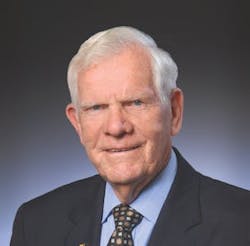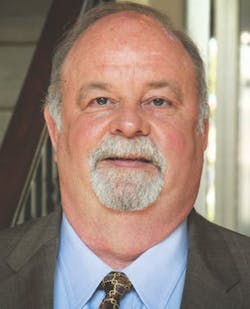Ralph Drees
Lee Evans Pinnacle of Management Excellence Award
When Ralph Drees joined his father’s home building business in 1959, the company had already been in operation for 30 years. Drees grew up in the business, but it was in 1959 that he bought his first lots and became a partner.
Today, Ft. Mitchell, Ky.-based Drees Homes is one of the 25 largest home builders in the country, and Ralph Drees is being recognized with the Lee Evans Pinnacle of Management Excellence Award for his lifetime of achievement. He is the third recipient of the award, following Dave Showers of Wayne Homes in 2005 and Tom Bradbury of Colony Homes in 2008.
“This is not an annual award,” says Chuck Shinn, Builder Partnerships founder and administrator of the Lee Evans Awards. “It is given sparingly to honor builders who have had a lifetime of achieving superior management practices and visionary leadership. Ralph followed Lee Evans from some of the early years as he grew his company.”
To be considered for the award, a builder must be retired and out of the business for at least five years. And, says Shinn, “They have had to show a commitment to superior management philosophies and procedures and demonstrate superior performance from a financial standpoint throughout their careers.”
Drees differentiated himself early with a focus on management and excellence in results. He also devoted himself to improving the business. “The first seminar I ever went to was in Dayton, Ohio, with Lee Evans,” he says. “I took everything in and I listened. And I thought the parts that will work, we’ll do them, and some parts we won’t do.”
Drees continued to learn throughout his career. He is now retired and living in Florida while his son, David, runs Drees Homes. When he started, Ralph was fresh out of the Army after a two-year stint, and he bought lots in a different community than his father. They operated relatively independently of each other. “We called it a partnership,” he says, “but it was a loose term.” Drees aimed for a lower price point than his father, primarily because that better fit the needs of his market. “Any time I called him up, he’d help, and he’d come over to check us out every once in a while; but primarily, we operated independently.”
“My dad was pretty easy going,” he says, “but I wasn’t satisfied with one subdivision. I had to get my second one, and third. But I also was in a county with a lot more growth so that was easier to do. I thought if you get something successful, repeat it. Just go to another location.”
That plan helped him to respond to the housing crisis in the early 1980s. “Manufacturing was the biggest thing in Cincinnati, but that all went south,” he says. “We had a few days when the prime was 21½, and you can’t sell a house with 18-percent interest. But I figured I’ve got to do something. So we started up in Dallas. If we’d gone somewhere else, we could have fallen on our face, and we looked at a few other areas. The Dallas marketplace, at that point, was just coming back like crazy. By the time we got started in the middle of 1984, things were booming. We thought if we go there and we don’t make it, it’s our fault. But if we go there and we’re successful, then we know we can do it. Once we did that, we expanded to some other cities as soon as we had enough capital.” That successful expansion moved the company into new markets and provided the fuel for its long-term growth. Under his direction, the company grew significantly.
Drees attributes a lot of his success to Lee Evans. “I think he was a guru. He helped us a lot back in those days. A good number of the successful builders took his seminars. He was very important to the industry and very important to builders, especially if their background was to be cost-conscious. One of my strong suits was I knew exactly what my costs were. Back then, a lot of builders didn’t and just started building.”
Streetman Homes
Lee Evans Award for Management Excellence
How do you earn a Lee Evans Award for Management Excellence? Deliver 22 consecutive years of profitability even during the worst housing recession in history. Streetman Homes in Austin, Texas, did just that by implementing strong management systems, delivering high customer satisfaction, and building top-notch homes.
Streetman targets lots in master planned communities and builds high-end homes for very selective buyers who demand top quality. It also strives to deliver the best customer service. Overlay strict discipline, and you get a home builder with a predictable revenue stream and strong cost controls that delivers profitability. “We’re not the cheapest guy,” Streetman says. “But profitability is the only real security for the employees, the company, and the people with whom we conduct business.”
Discipline and focus began with the start of the company when Streetman penned a mission statement that still defines the company and identifies core values. “We really focus on customer satisfaction,” Streetman says, articulating those principles. “We try to hire the best people available and respect, support, and reward them. We commit to excellence. We try to honor our commitments. We try to be honest in our dealings. We get the most value for the use of the company’s assets. We enhance our value through efficiency, and we ask all of our employees to constantly strive to improve themselves and the company. We make decisions that optimize long-term results. Those are really our guiding values.”
Those values complement the management philosophy extolled by Lee Evans and, later, Chuck Shinn. “I’ve known this company for a long time,” Shinn says. “It is totally superior in its practices. What Randy did—how he managed the downturn—is amazing. They’ve done just a fantastic job watching the p’s and q’s of the company.”
During the housing recession, those principles were tested in new ways, but still the company remained profitable. “We ran low on lots,” Streetman says. “We fell as far back as 70 or 80 closings. Our overhead got way out of whack. Then we benefited on the back side.” By keeping its people and maintaining a low debt ratio, the company was able to act quickly when the market started to rebound.
Streetman Homes targets a specific margin. Referring to the Lee Evans performance benchmarks, Streetman says, “It becomes a self-disciplining tool because if you’re targeting making a margin, then that limits the number of communities you’re going to go into because you can’t go do a bunch of marginal deals to just churn units. If it doesn’t provide the right kind of environment for our homeowners and the right kind of building margin, we don’t go into it.”
But the discipline, core values, and excellence in construction are just structures that support the real success of the company. “I don’t believe my job is to build homes,” Streetman says. “I believe my job is building people.” To achieve a strong employee culture, Streetman focuses on training employees as opposed to hiring people who have already been trained. “We find it’s more difficult to do a simultaneous heart and lung transplant and lobotomy than it is to train somebody yourself,” he says.
Adopting new technologies, implementing systems, and improving efficiencies are all geared to securing the future of the talent he has. “Our 10 senior employees have around 140 years of experience in the company,” he says. “I’ve been blessed with a wonderful staff. We have a great team with a good mix of people. Gray hairs, young hairs, some hired right out of college.”
Streetman Homes, which was acquired by Standard Pacific in June 2014, has been building homes and earning a profit for 22 years, providing structure and growth for the 33 employees of the company, and stability for the companies with which it does business. But more importantly, the company became an essential part of the Austin community and improved the lives of more than 2,300 homeowners and their families. PB
Sign-up for Pro Builder Newsletters
Get all of the latest news and updates.


